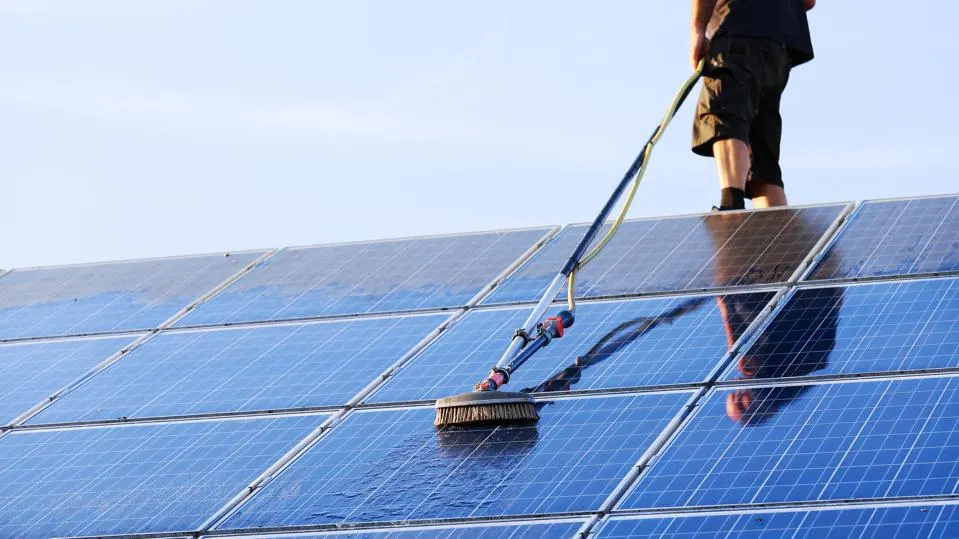Dust, dirt, bird droppings, leaves, and other debris can accumulate on the surface of solar panels and block sunlight, reducing their efficiency. Clean solar panels can absorb sunlight more effectively and ensure that the panels operate at peak performance.
Cleaning solar panels is a relatively simple process that can be done using some basic tools and equipment.
Utilizing the correct solar panel cleaning tools can extend the lifespan of your solar system and save you a significant amount in repairs.
In this article, we will guide you on how to easily maximize solar energy production and the essential solar panel cleaning tools you should possess.
Why Should You Clean Solar Panels?
Solar panels transform sunlight into functional energy. This process requires the photovoltaic cells inside the panels to capture the sun’s rays effectively.
However, if dirt, debris, or layers of filth obstruct these solar cells, this will damage the solar panels and cause performance issues.
Studies from the National Renewable Energy Laboratory suggest that contaminants like dust and soot can reduce solar panel efficiency by 7% in parts of the United States to as high as 50% in the Middle East.
World Academy of Science, Engineering, and Technology found that dirty solar panels can lose 20% of their energy output. The National Renewable Energy Laboratory puts that figure even higher, at 25%.
Fortunately, addressing this issue is straightforward. Simply washing and cleaning the solar panels with a standard cleaning solution can eliminate the dirt, restoring the panels to their optimal efficiency.
When to Clean Solar Panels?
While there isn’t a strict guideline for cleaning intervals, it’s generally recommended to clean your panels at least biannually.
Several variables, such as your location, climatic conditions, and the panel type, can influence their dirt and grime accumulation.
For instance, residing in a desert area might necessitate more regular cleanings because of sand and dust accumulation.
On the other hand, in areas with regular rainfall or snowfall, nature itself helps keep the panels relatively clean.
It’s also vital to note the type of panels you possess.
Older, textured solar panels might need more cleaning due to dirt settling in their crevices. In contrast, modern, sleek panels are simpler to clean and might need less maintenance.
Dos
We strongly advise having a professional clean your panels. However, if you choose to do it yourself, prioritize safety by using essential equipment like a harness.
For cleaning, a mix of water and gentle soap or a specialized cleaning solution for photovoltaic panels works best.
Here’s a simple guide to help you with the cleaning:
- Start by rinsing the panels to clear off any loose dirt or particles.
- Prepare a cleaning mixture using water and mild soap, like dishwashing liquid, or opt for a dedicated solar panel cleaning solution.
- With a soft cloth or squeegee, gently apply the cleaning mixture to the panels.
- For persistent dirt, use a soft-bristled brush to scrub gently.
- Thoroughly rinse the panels with water, ensuring no cleaning agent or soap remains.
- Dry the panels using a clean, soft cloth.
Don’ts
While cleaning solar panels, steer clear of practices that might harm the panels or diminish their performance:
- Avoid harsh materials and chemicals: Using abrasive tools like wire brushes or rough pads can scratch the panels, hindering their sunlight absorption. Also, stay away from aggressive chemicals that might damage the panel’s surface.
- Opt for a cloudy day: It’s not ideal to clean the panels under the blazing sun, as the cleaning agent can evaporate rapidly, leaving behind streaks or residues. It’s better to clean them on an overcast day or in a shaded area.
- Refrain from high-pressure cleaning: Don’t resort to high-pressure hoses or water jets, as they can harm the panels and their sealing, potentially leading to water damage in the electrical parts.
- Never walk on the panels: Stepping on the panels can not only reduce their efficiency due to physical damage but also risk voiding the manufacturer’s warranty.
Is It Safe To Clean Solar Panels With Water?
Non-heated, potable water with normal pressure is the safest option for cleaning solar panels. You can also use over-the-counter glass cleaners like Windex, equivalent solution, or 3% soap-and-water solution to remove dirt and grime.
However, avoid using hard or mineral-rich water as it can damage the panels over time.
If there is stubborn grime or dirt build-up on the panels, a pressurized water spray of up to 1,500 psi may be used.
This pressure is sufficient to remove dirt without damaging the panels.
Following the manufacturer’s guidelines when cleaning your solar panels is important.
Cleaning solar panels with water is safe if you use non-heated, potable water with normal pressure and avoid using hard or mineral-rich water.
When Should You Call a Pro?
Dust or debris will likely be washed away by the rain, making professional cleaning unnecessary.
However, you might want to think about seeking expert help if:
- You reside in a highly polluted or seaside location.
- Your solar panels are close to shedding trees.
- You spot stubborn deposits on your panels, like bird feces.
- You’re a senior or feel uneasy about climbing onto your roof.








